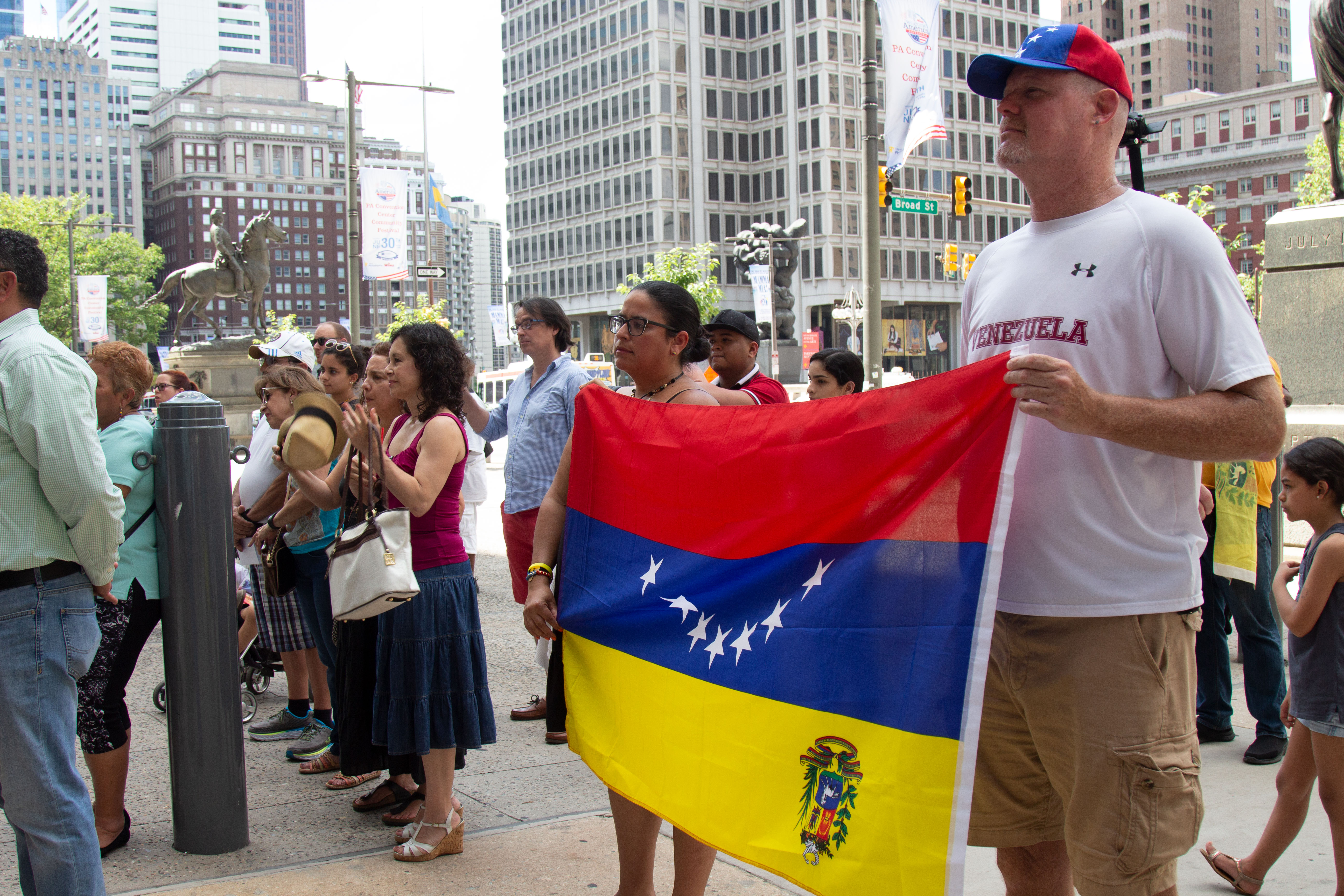
Venezuelan flag raised amid escalating humanitarian crisis
Casa de Venezuela and city political representatives commemorated Venezuelan independence — while hoping for a second revolution.
Venezuelans in Philadelphia and city representatives raised the Venezuelan flag on July 5 at City Hall to recognize the country’s independence from Spain in the 19th century and those currently fighting for their freedom in the South American nation, which continues to suffer from its years-long humanitarian crisis.
In light of this disaster, the mood of the flag raising event was not celebratory.
The Venezuelan-Americans in the crowd spoke of the devastation in their home country, remembered their relatives who remain there and reflected on the past two decades, in which independence and basic human rights have diminished in Venezuela under dictatorship.
“Venezuelans, what we are asking, is for another independence day,” Myrteny Metzger, a member of Casa de Venezuela, said at the event.
Casa de Venezuela is a nonprofit organization dedicated to advancing the culture of the Venezuelan community in the Greater Philadelphia region and raising awareness about the worsening situation in the country. The group led the day’s flag raising ceremony.
U.S. Congressman Brendan Boyle (D-PA), Councilwoman Maria D. Quiñones-Sanchez and City Representative Sheila Hess demonstrated their political support for Venezuelan immigrants and refugees, speaking against the cruelty of President Nicolás Maduro. Boyle, who has been advocating in Congress for humanitarian aid and political action against Maduro, stood and stated solemnly that the average person in Venezuela has lost 24 pounds in the past year due to malnutrition and 90 percent of citizens live in poverty.
Casa de Venezuela gained the outward political support of Rep. Boyle following Maduro’s allegedly fraudulent re-election in May, when the congressman sent a letter to U.S. Secretary of State Mike Pompeo urging the federal government “to use all tools in our diplomatic toolkit, including humanitarian assistance and support for democracy.”
Rep. Boyle co-sponsored House Bill 2658, the Venezuela Humanitarian Assistance and Defense of Democratic Governance Act, which passed in the House in December 2017 and is awaiting a decision from the Senate and its Committee on Foreign Relations. The bill would have the State Department assert more pressure of the Maduro regime and “provide humanitarian assistance to the people of Venezuela through credible and independent non-governmental organizations.”
Thousands of Venezuelans flee their country each day, and those who come to the metro area have recognized Philadelphia as a “sanctuary” and welcoming place for immigrants and refugees. President of Casa de Venezuela Fernando Torres said that Mayor Jim Kenney and Quiñones-Sanchez do what they can as city officials to support and protect his community and show appreciation for the influx of Venezuelans with professional degrees who benefit the economy.
In his speech, Torres also cited the deep connection Venezuelan independence has with the American Revolution and Philadelphia, as the Venezuelan revolutionary leader Francisco de Miranda visited the Founding Fathers in the city during the 18th century. There is a statue, gifted by Venezuela, of Miranda at 20th Street and the Benjamin Franklin Parkway.
“The touch of Venezuela to Philadelphia goes back the entire time the United States has been a country,” Torres said. “It’s unique, we like to remind people that every once in a while because we are immigrants now, but we’ve been here since day one.”
RELATED CONTENT
[node:field_slideshow]
Torres condemned the stigmatization of Hispanic immigrants and the Trump administration’s addition of Venezuela to the president’s travel ban. He said the ban labels all Venezuelans seeking asylum at ports-of-entry as terrorists, not just the corrupt officials, who he agrees should be barred from the U.S.
The travel ban was approved by the U.S. Supreme Court in June, and restricts Venezuelan applications for asylum, visas and refugee status. The restrictions, however, apply to a "narrow category of government officials deemed responsible for failing to cooperate with the Department of Homeland Security.”
Maduro’s regime has taken violent action against those who oppose the government, shut down almost every independent media outlet in the country and continues to deny allegations of corruption and mistreatment of its people. Venezuela’s economy, access to food and medicine, and civil rights have continued to slip under Maduro, who has become the legacy of former dictator Hugo Chávez’s push for socialism and complete state control of the country’s wealth.
In another violation of democratic civil rights, the state’s media watchdog - one of Venezuela’s last major independent news outlets, El Nacional - is facing government censorship. El Nacional has historically been unapologetically critical of Maduro, and the largest, most established media outlet in the country to be in outright opposition.
The flag raising in Philadelphia, which showed solidarity with Venezuelan nationals suffering under the Maduro regime, came only hours after 50 countries issued a joint statement to the United Nations Human Rights Council for Venezuela to allow humanitarian assistance into the country and halt widespread corruption. The United Nations and its members have been issuing sanctions against the parties suspected of corruption, further isolating Venezuela’s economy from the rest of the world, but the intergovernmental organization’s human rights office indicated in a June 2018 report of the crisis that there is no end in sight.
The U.S. was not present on the joint statement, however, as it withdrew from the Human Rights Council in June with claims of a “chronic anti-Israel bias.” The Trump administration has remained outspoken about the gross violation of human rights occurring in Venezuela, and the country’s political crisis remains the administration’s focus in Latin America.
Recent reports say President Trump asked advisers last year about taking military action against the country. Maduro denounced the idea of a U.S. invasion on July 5 during a military ceremony in Caracas, and Torres said war is not what the Venezuelan people want either.
“Hopefully, we can get peace and Nicolás Maduro resigns and leaves the country over political pressure,” Torres said. “We truly believe the international community can put enough pressure to him.”











LEAVE A COMMENT: